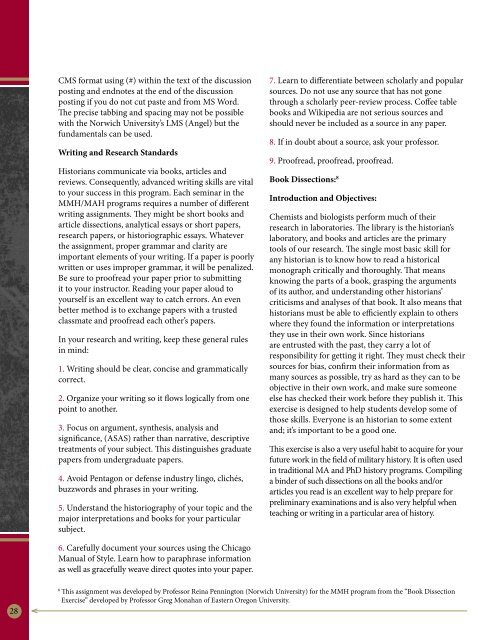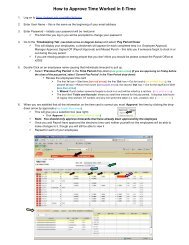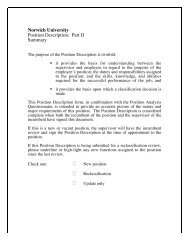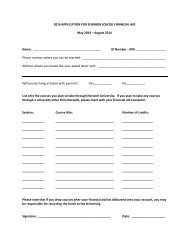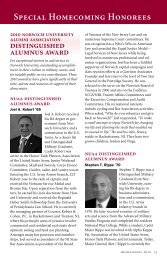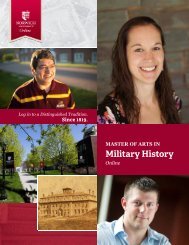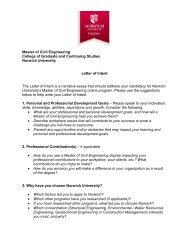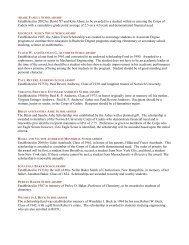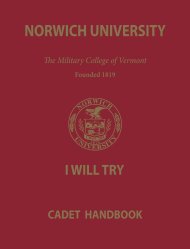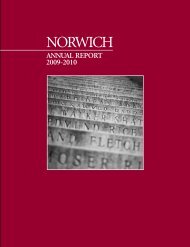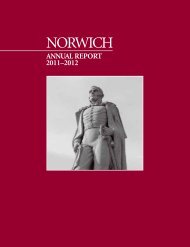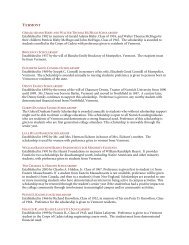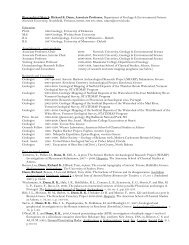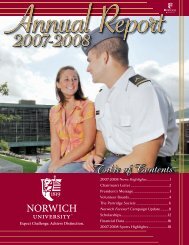Surviving Master's-Level History Programs at Norwich University: A ...
Surviving Master's-Level History Programs at Norwich University: A ...
Surviving Master's-Level History Programs at Norwich University: A ...
- No tags were found...
Create successful ePaper yourself
Turn your PDF publications into a flip-book with our unique Google optimized e-Paper software.
CMS form<strong>at</strong> using (#) within the text of the discussionposting and endnotes <strong>at</strong> the end of the discussionposting if you do not cut paste and from MS Word.The precise tabbing and spacing may not be possiblewith the <strong>Norwich</strong> <strong>University</strong>’s LMS (Angel) but thefundamentals can be used.Writing and Research StandardsHistorians communic<strong>at</strong>e via books, articles andreviews. Consequently, advanced writing skills are vitalto your success in this program. Each seminar in theMMH/MAH programs requires a number of differentwriting assignments. They might be short books andarticle dissections, analytical essays or short papers,research papers, or historiographic essays. Wh<strong>at</strong>everthe assignment, proper grammar and clarity areimportant elements of your writing. If a paper is poorlywritten or uses improper grammar, it will be penalized.Be sure to proofread your paper prior to submittingit to your instructor. Reading your paper aloud toyourself is an excellent way to c<strong>at</strong>ch errors. An evenbetter method is to exchange papers with a trustedclassm<strong>at</strong>e and proofread each other’s papers.In your research and writing, keep these general rulesin mind:1. Writing should be clear, concise and gramm<strong>at</strong>icallycorrect.2. Organize your writing so it flows logically from onepoint to another.3. Focus on argument, synthesis, analysis andsignificance, (ASAS) r<strong>at</strong>her than narr<strong>at</strong>ive, descriptivetre<strong>at</strong>ments of your subject. This distinguishes gradu<strong>at</strong>epapers from undergradu<strong>at</strong>e papers.4. Avoid Pentagon or defense industry lingo, clichés,buzzwords and phrases in your writing.5. Understand the historiography of your topic and themajor interpret<strong>at</strong>ions and books for your particularsubject.7. Learn to differenti<strong>at</strong>e between scholarly and popularsources. Do not use any source th<strong>at</strong> has not gonethrough a scholarly peer-review process. Coffee tablebooks and Wikipedia are not serious sources andshould never be included as a source in any paper.8. If in doubt about a source, ask your professor.9. Proofread, proofread, proofread.Book Dissections: 8Introduction and Objectives:Chemists and biologists perform much of theirresearch in labor<strong>at</strong>ories. The library is the historian’slabor<strong>at</strong>ory, and books and articles are the primarytools of our research. The single most basic skill forany historian is to know how to read a historicalmonograph critically and thoroughly. Th<strong>at</strong> meansknowing the parts of a book, grasping the argumentsof its author, and understanding other historians’criticisms and analyses of th<strong>at</strong> book. It also means th<strong>at</strong>historians must be able to efficiently explain to otherswhere they found the inform<strong>at</strong>ion or interpret<strong>at</strong>ionsthey use in their own work. Since historiansare entrusted with the past, they carry a lot ofresponsibility for getting it right. They must check theirsources for bias, confirm their inform<strong>at</strong>ion from asmany sources as possible, try as hard as they can to beobjective in their own work, and make sure someoneelse has checked their work before they publish it. Thisexercise is designed to help students develop some ofthose skills. Everyone is an historian to some extentand; it’s important to be a good one.This exercise is also a very useful habit to acquire for yourfuture work in the field of military history. It is often usedin traditional MA and PhD history programs. Compilinga binder of such dissections on all the books and/orarticles you read is an excellent way to help prepare forpreliminary examin<strong>at</strong>ions and is also very helpful whenteaching or writing in a particular area of history.6. Carefully document your sources using the ChicagoManual of Style. Learn how to paraphrase inform<strong>at</strong>ionas well as gracefully weave direct quotes into your paper.288This assignment was developed by Professor Reina Pennington (<strong>Norwich</strong> <strong>University</strong>) for the MMH program from the “Book DissectionExercise” developed by Professor Greg Monahan of Eastern Oregon <strong>University</strong>.


